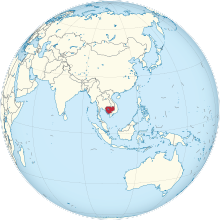Squatting is common in the country of Cambodia. Following the Khmer Rouge and the Pol Pot regime, the new democratic government introduced land reform. In the capital Phnom Penh, where in 2003 an estimated 25 per cent of the population was squatting, there are informal settlements and occupied buildings.


Land disputes and evictions are common across Cambodia. Squatters are known officially as the "urban poor" or "temporary residents".
Legality
editSquatting is not an activity defined in Cambodian law.[1]: 468 In the Khmer language, "squatter" means an anarchist and "squatters settlements" literally translate as "places where anarchy and confusion reign" therefore officially squatters are referred to by different names, such as the "urban poor" or "temporary residents".[2]: 5, 18, 21
History
edit20th century
editAfter the Khmer Rouge was ousted in 1975, many people returned to Phnom Penh and began living in their old houses or squatted informal settlements if their homes were already occupied.[3] One example of a squatted building was the White Building.[4] Under the Pol Pot regime (1975–1979) almost all the country's cadastral officials had been murdered.[1]: 473
In 1989, the new State of Cambodia launched a sweeping land reform program, recognising 4.9 million claims for title between 1989 and 1993.[5] The United Nations Transitional Authority in Cambodia (UNTAC) oversaw reforms and also caused land prices to soar by inserting $2.8 billion into the local economy.[5]
21st century
editUntil the end of the 1990s, the Phnom Penh authorities did not recognise squatters and tended to evict squats. As of 2003, an estimated 25 per cent of the city's population were squatters.[2]: 5, 16 Land disputes and evictions are still common. The World Bank estimated that in Phnom Penh alone, 11,000 households had been evicted between 1998 and 2003.[6]
In 2005, soldiers shot dead six squatters in an eviction and the following year, soldiers and riot police were used to evict a thousand slum-dwellers in Phnom Penh.[7] Amnesty International stated in 2008 that 150,000 people were at risk of being forcibly displaced.[6]
As of 2014, there were estimated to be 300 slums in Phnom Penh, including the Hemakcheat, a former cinema.[3] There are many land disputes and the government has created the Cadastral Commission and the National Authority for Land Dispute Resolutions.[1]: 491
In 2023, the Cambodian government evicted about 10,000 families who had been living near the Angkor Wat temple.[8] As a result, Amnesty International criticized UNESCO for failing to challenge the evictions, which according to Amnesty International violated both Cambodian law and international law.[8][9] In March 2024, Cambodia responded by denying the allegations, claiming that it had only been moving out squatters and not longtime village residents.[10]
References
edit- ^ a b c Hap, Phalthy (2013). "Law Enforcement Towards Squatters in Cambodia". KLRI Journal of Law and Legislation.
- ^ a b Fallavier, Pierre (2003). "The case of Phnom Penh" (PDF). Urban Slums Reports. UCL. Retrieved 12 April 2021.
- ^ a b McPherson, Poppy (23 July 2014). "Inside the famous Phnom Penh cinema that has become a living nightmare". The Guardian. Retrieved 12 April 2021.
- ^ Hale, Erin (4 December 2015). "A Utopian, Futurist Housing Project in Cambodia Has Seen Better Days". Slate Magazine. Retrieved 12 April 2021.
- ^ a b Collins, Erin (1 December 2016). "Postsocialist informality: The making of owners, squatters and state rule in Phnom Penh, Cambodia (1989–1993)". Environment and Planning A: Economy and Space. 48 (12): 2367–2382. doi:10.1177/0308518X16658664. S2CID 151319081.
- ^ a b Mydans, Seth (17 July 2008). "In Cambodia, progress for some means eviction for others". The New York Times. Retrieved 12 April 2021.
- ^ "Cambodian troops evict squatters". Business & Human Rights Resource Centre. 6 June 2006. Retrieved 12 April 2021.
- ^ a b Peck, Grant (14 November 2023). "UNESCO is criticized after Cambodia evicts thousands around World Heritage site Angkor Wat". AP News. Retrieved 27 April 2024.
- ^ "Amnesty accuses Cambodia over 'forced evictions' at Angkor Wat". France 24. 14 November 2023. Retrieved 27 April 2024.
- ^ Rising, David (4 March 2024). "Cambodia defends family relocations around the famous Angkor Wat temple complex". AP News. Retrieved 27 April 2024.